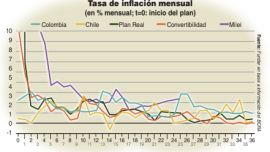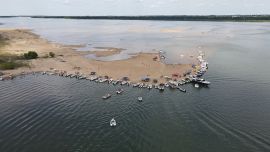Luis Carlos Sarmiento Gutiérrez would figure to be one of the people fretting the most about the looming election of the first left-wing leader in Colombia’s modern history. Sarmiento oversees the biggest banking operation in the country, Grupo Aval, and a US$7-billion family fortune that ranks as one of the largest in all of Latin America.
But Sarmiento, at least publicly, betrays little angst about the outcome of the vote this month.
Soaring commodity exports are turning Colombia into the fastest-growing major economy in the Americas and this, he figures, will have a moderating effect on the policies of whoever assumes the presidency in August. What’s more, he says, both candidates – Gustavo Petro, who’s campaigned on weaning Colombia off oil and coal exports, and his conservative rival Federico 'Fico' Gutiérrez – are smart, experienced politicians who know it’s not in their interest to upend the economy.
“The economy is growing and everybody rides the growth of the economy, regardless of what they say,” Sarmiento, 60, said in an hour-long interview. “So I think that as long as that keeps happening, we’ll see more or less the same.”
Right now, Sarmiento sees booming growth across the board at Aval, too – in its traditional bank lending business as well as in its investments in infrastructure and agriculture.
“Loan growth is performing very nicely. The tourism business, hotels are back to black,” said Sarmiento, who took over as CEO in 2000. “Also agribusiness, which is the other business that we have, is seeing a lot of momentum from the fact that a big chunk of inflation is food inflation.”
Aval has investments in soybean oil, cattle, fisheries, and rubber, he said.
Colombia’s economy is set to grow 5.8 percent this year, more than double the region-wide average of 2.5 percent, according to the International Monetary Fund. In the first quarter, gross domestic product expanded 8.5 percent from a year earlier while March retail sales and manufacturing beat estimates by large margins, rising about 12 percent each.
Colombia goes to the polls this month after watching how Andean neighbours Peru and Chile elected leftist leaders in 2021. While those political shifts brought investor anxiety and uncertainty, the newly elected leaders have largely avoided any radical policy shifts.
Aval Empire
The Aval empire, which was started by Sarmiento’s father in the early 1970’s, now includes Banco de Bogotá, the third-biggest bank in Colombia by assets; Porvenir, the largest pension fund manager; investment-holding company Corficolombiana and a brokerage.
Sarmiento, whose career began with stints at Procter & Gamble Co. and a First Bank of the Americas in New York after earning an MBA at Cornell University, spoke ahead of the Bloomberg New Economy Gateway Latin America event in Panama, of which he’s an advisory board member.
Earlier this year, Aval shareholders approved the spin-off of BAC Holding International, a Panama-registered company that will serve as the holding for BAC Credomatic Inc, one of the largest private banks in Central America. While the assets are now trading higher as separate entites, the market is still underestimating their value, he said.
As bullish as Sarmiento sounded on the Colombian economy, there are plenty of risks for a country that is still recovering from the collapse triggered by the pandemic.
The commodity price surge and rising consumption may be fueling a boom in growth but they’re also sparking a surge in consumer prices similar to those seen elsewhere. Inflation has jumped to a two-decade high of 9.2 percent, forcing the central bank to aggressively ratchet up interest rates.
The economy will slow at some point but commodity exports and regulated businesses like gas distribution should hold up, but any business that depends on imports will suffer, Sarmiento said.
“Retailers are doing spectacularly well, but those you need to view with some caution because the party isn’t going to last forever. Anything that is dependent on imports is going to be hit hard. I don’t see the exchange rate really coming back down too much and raw materials all over the world are going through the roof,” he said. “You’ve got to look at industry by industry and some will be negatively affected.”
related news
by Daniel Cancel & Andrea Jaramillo, Bloomberg





















Comments